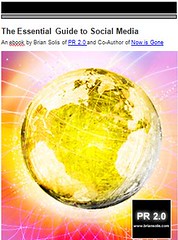I Like You: The Emerging Culture of Micro Acts of Appreciation with Macro Impact

Source
Like is the new favorite, which was at the time, was the new bookmark. This small, but important feature will no less, reinforce relationships between friends and followers and those who produce, interact with, and share content.
Made popular by services such as FriendFeed, and now Facebook, the idea of liking an update is much bigger than merely bookmarking or favoriting (yes, it’s a new verb in the social web) updates from friends and contacts for later reference. The act of liking is quickly emerging as a simple, but complimentary gesture of acknowledgment and reciprocation to recognize the contribution of someone whom you follow.
FriendFeed

As Robert Scoble notes, FriendFeed is Facebook’s R&D department. Recently, Facebook introduced the act of liking updates directly into the personal, and precious, News Feed a.k.a. the Statusphere.

New services and communities are also debuting based on the premise of liking. Likaholix, for example, builds a community around reciprocity and those who actively like relevant material.

Likaholix fuses bookmarking and the kindness of liking with influence. It creates a layer of “tastemakers” around those topics and fields in which users emerge as experts based on their consistent, themed contributions and activity within the network.
Liking is the epitome of the relationship-based culture powering the authenticity, ethics, and reciprocal interactions on the Social Web. It’s a powerful form of micro recognition, which serves as an approving, motivating, and uplifting nod from someone else.
Likes also offer a macro impact within social networks. The deed of liking an update resonates within and outside the social graph as those who follow your activity will now receive an introduction to something that caught your attention, thus amplifying the source post or update to span across the relevant net as well as the network of friends of friends (FoFs).

As the social Web and new services continue the migration and permeation into everything we do online, we’re endlessly faced with an increasingly thinning state of continuous partial attention (CPA). It’s affecting how and what we consume, when, and more importantly, how we react, participate and share. That “something” is forever vying for our attention and relentlessly pushing us to do more with less driven by the omnipresent fear of missing out on what’s next. However, the act of liking is a symbol for how we can still publicly appreciate updates and those behind them without carving out precious time to formally comment or bookmark them in external networks.

Source: Andreina
Likes are incredibly powerful as they facilitate the sharing of love in byte-sized actions that reverberate throughout social networks, resulting in a formidable network effect of movement or diversion. It is the digital curation of relevant content that binds us contextually. Liking sets the stage to introduce not only new content to new people, but also facilitates the forging of new friendships in the process.
How does this change how you discover and share updates and content?
Related Posts on PR 2.0:
- BackType Connects the Conversation Graph
- Tracking Brands on Twitter to Improve How You Listen and Engage
- Facebook Swims Its Way into Your Lifestream: What the Facebook news means to you
- Top Trends and Apps: How Do People Use Twitter?
- The Ties that Bind Us - Visualizing Relationships on Twitter and Social Networks
- Make Tweet Love - Top Tips for Building Twitter Relationships
- The Battle for Your Social Status
- How Dell Deals with Twitter
- Introducing MicroPR, A Resource for Journalists, Analysts, & Bloggers on Twitter
- Twitter Tools for Communication and Community Professionals
- Is Twitter a Viable Conversation Platform
- Is FriendFeed the Next Conversation Platform
Connect with me on:
Twitter, FriendFeed, LinkedIn, Tumblr, Plaxo, Plurk, Identi.ca, BackType, Social Median, or Facebook
---
Subscribe to the PR 2.0 RSS feed.
---
Now available:


---
pr pr+2.0 pr2.0 public+relations marketing advertising interactive social+media socialmedia brian+solis social media media2.0 media+2.0 2.0 smo social+media+optimization marcom communication publicity like liking favorite bookmark love micro continuous partial attention cpa scarcity economy reciprocity recipricol favor facebook friendfeed likaholix












7 Comments:
I LOVE this.
Fascinating. Our need to acknowledge eachother in the social web consistently increases with the growing Dunbar number. Yet, what is considered an act of acknowledgement seems to be shrinking or so much less than what it was just a year or two ago (like bookmarking or reposting). You have a great blog. Thanks for sharing the knowledge.
I 'like' this but will it turn into a kudo type thing where people are 'hearting' their friends and not relevant and useful content, therefore losing its value?
Thanks for posting, great content as always.
I like the idea of giving people 'kudos' for a great insightful update or posting link that is beneficial...
I just wonder whether this can be 'gamed' in anyway in the same way I have seen groups of people bookmark keyword loaded pages from multiple social networking sites. The pages all have links pointing to one website or page that matches the long-tail keywords and sells the 'matching' product...
Just a thought!
Karl
Great post! Thanks for the interesting read and useful advice :)
Lee.
@Brian - A great analysis about emerging culture. Spot on. I think you've hit on an important cultural trend. "Liking" publicly is the new blog comment. I wrote about the evolution of the RT and hit on some similar points a few months ago. I think the shift from "commenting on blogs" to "providing commentary via microblogging" with links back to the post is an important one to watch. It'll definitely be more important as individuals' audiences get bigger over time. Our shared consciousness about content "in Twitter-Time" seems to be the next big evolutionary step in, not just how we read, but how status is determined online.
The link to my "evolution of the Retweet" post is in the URL field.
Again, good post. i enjoyed this. very insightful.
Great article! ilikeucoz (ilikeucoz.com) has been following (and being part of) this trend too - but love the way you've captured it in your headline 'Emerging Culture of Micro Acts of Appreciation with Macro Impact.' Check out http://ilikeucoz.wordpress.com to see what we've been saying about this trend.
Post a Comment
<< Home